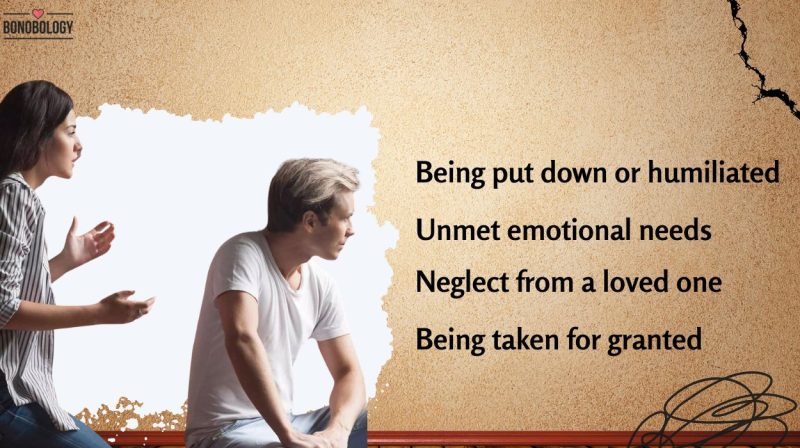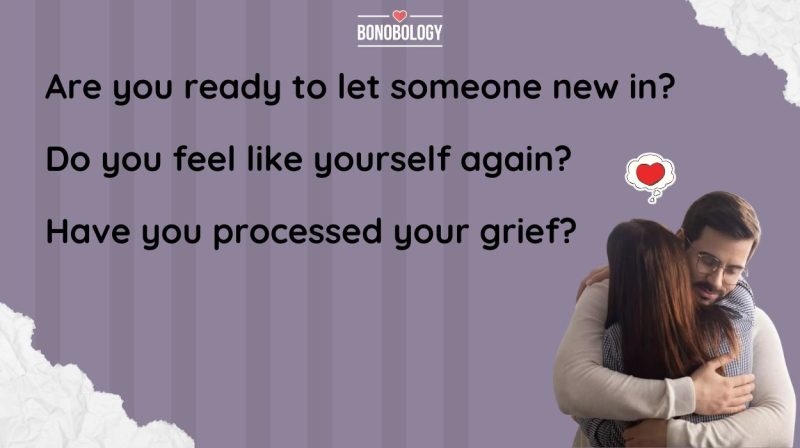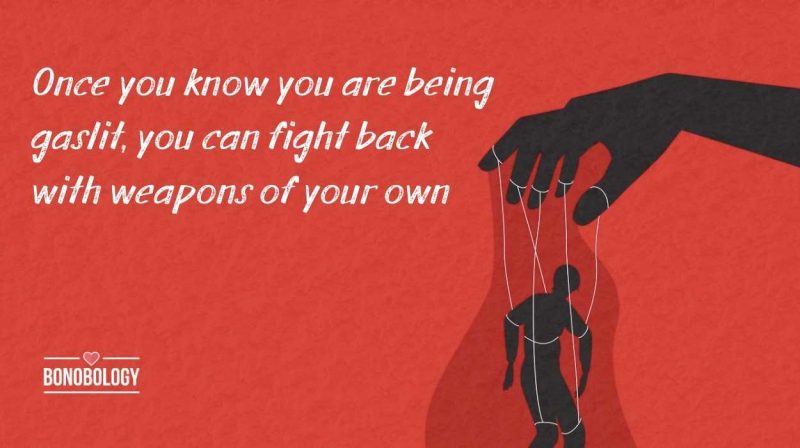Resentment in a relationship can be akin to a termite infestation compromising the structural integrity of a building. If left unaddressed, it can render even the strongest of bonds hollow from within and cause partners to drift apart. Resentment makes a person bitter and toxic. It creates trust and anger issues and can be detrimental to one’s mental health if left to fester for too long. Given the potential threat it poses, it is imperative to figure out how to let go of resentment in a relationship.
We’re here to help you with that. But before we get to it, it’s equally important to understand what resentment toward a significant other feels like and where it stems from. There can be various reasons a person may become resentful but one of the main causes is definitely unhealed emotional wounds of the past that get triggered at the slightest provocation or by the most trivial of events. Let’s delve deeper for a clearer perspective.
What Is Resentment In A Relationship?
Table of Contents
This brings us to the question: What is resentment in a relationship? Well, resentment is often described as an angry and emotional reaction to being treated unjustly or, as the Oxford Languages Dictionary, puts it – a “bitter indignation at having been treated unfairly”. It’s basically experiencing overwhelming and bitter feelings as a result of unjust or negative treatment by loved ones. Resentment often causes irreparable damage to one’s trust in love and relationships.
Resentment can also cause one to feel shame, bitterness, anger, and harbor a desire for revenge for the way one has been treated – an insensitive comment made by a friend, unjust treatment by family (intentional or unintentional), or criticism at work. The person may feel victimized, behave in a passive-aggressive manner, and hold on to the hurt and grudge for a long time until it comes out in the form of emotional outbursts of anger.
Someone experiencing resentment may feel a whole range of negative emotions including disgust, disappointment, anger, fear, and shock. Letting go of resentment in a relationship or forgiving the person who caused it may become extremely difficult. It takes deliberate effort to ensure that emotional baggage from the unpleasant experiences of the past does not take a toll on your present and future.
Related Reading: 9 Signs He Regrets Hurting You
What Causes Resentment In A Relationship?

Before we figure out how to deal with resentment in a relationship, let’s understand its causes. So, why does a person become resentful? What causes resentment in a relationship? Well, there can be several reasons but the most common one seems to be being mistreated, wronged, or betrayed by another person. Resentment in relationships is an extremely destructive, poisonous, and difficult feeling to overcome or let go. It engulfs you physically, emotionally and psychologically causing severe damage to your mental health and well-being, and triggering a host of relationship issues.
The feeling of resentment usually originates from past experiences of insult or wrongdoing by someone and can be triggered when those behaviors are repeated. There can be a vast spectrum of negative experiences that can make a person resentful such as:
- Being put down or humiliated
- Unmet emotional needs
- Neglect from a loved one
- Being taken advantage of
- Being taken for granted
- Feeling unheard and unseen in a relationship
- Emotional abuse such as gaslighting, stonewalling, silent treatment, romantic manipulation
- Physical or verbal abuse
- Betrayal
When a person doesn’t process the negative emotions triggered by these unpleasant experiences or doesn’t communicate their thoughts and feelings about these to their partner, the bottled-up emotions can quickly give way to resentment. They tend to replay the negative experience in their mind over and over again, which can make it difficult for them to let go, forgive and move on.
What Are The Signs Of Resentment In A Relationship?
Feeling resentful toward someone takes away your ability to forgive them or let go of the matter because there is just so much anger and hurt filled inside you. Having said that, every human being is different. The relationship they have with their partner is different. But there are a few common signs to watch out for to determine whether someone is experiencing resentment in a relationship:
- Constantly feeling negative emotions of anger, frustrations, disgust, and bitterness
- Finding it impossible to forget or stop thinking about the event/s that caused resentment
- Feeling regret or wishing that you had acted in a different manner
- Engaging in passive aggressive behavior
- Less interest in emotional and physical intimacy
- Strong desire for revenge
- Angry outbursts every now and then
- Constant fights and arguments that, at times, occur without valid reason
It is important to recognize and acknowledge these signs of resentment in a relationship, take preventive action, and get help before the situation goes out of hand. Read on to know about how you can let go of all your anger and resentment and move toward building a healthy relationship with your partner.
Related Reading: On-Again-Off-Again Relationships – How To Break The Cycle
How To Let Go Of Resentment?
Resentment, if left to fester, can turn a healthy relationship into a toxic one and also prove to be detrimental to your mental health. In such a situation, you may wonder how to get rid of resentment. Now that we’ve figured out the signs of resentment in a relationship, let’s understand how to get rid of anger and resentment. Well, there are letting-go exercises that can help you quell the negativity and replace it with a more positive outlook toward your relationship. Here are 5 ways that might just help you understand how to get over resentment in a relationship:
1. Understand your feelings and why you find it difficult to forgive
Before figuring out how to let go of anger and stop feeling resentful, it is important to understand what causes resentment in a relationship. Dig deeper, introspect and analyze your feelings. Consider where those overwhelming feelings and negative emotions of anger, disappointment, disgust, and fear are coming from. What do you feel when you think of those unpleasant past experiences? This is the first step of letting go of resentment in a relationship.
2. Be compassionate toward yourself
Learn to be compassionate toward yourself. You need to feel loved and worthy irrespective of how your partner may have treated you in the past and this is one way to get there. When you’ve held on to resentment for too long, it can begin to feel familiar and comforting because those emotions become a part of your being. It may have become your coping mechanism, but in the long run, it can prove to be poisonous and damaging to your mental health and well-being. Practicing self-compassion, self-care, and mindfulness can help you heal.
3. How to let go of resentment in a relationship? Practice empathy
How to let go of resentment? How to stop resenting someone? If you’re asking yourself these questions, being more empathetic could be the answer. Try empathizing with the person or situation that caused resentment. It might just help you see things from a different perspective. It could have been a misunderstanding that caused you to become resentful. Seeing things from the perspective of the person you have come to resent may help let go of some of those overwhelming feelings.
Related Reading: 9 Ways To Practice Mindfulness In Intimate Relationships
4. Focus on what you are grateful for
Instead of looking at yourself as the victim, try to focus on the positive and make a conscious effort to find things you’re grateful for. Spending time and energy doing what you love is important. Maintain a journal of all the things you are grateful for and those that bring you happiness and joy. It’s one of the most effective letting-go exercises there is. Focus on everything that is going right for you, things that you are fortunate enough to have.

5. Consult a therapist
This is one of the most important ways of letting go of resentment. Therapy can prove to be beneficial if you are dealing with resentment. A licensed therapist will help you get to the root cause of it and deal with it and guide you in the right direction so you can figure out how to get over resentment through different therapy techniques. The healing process may be difficult at first, but will eventually prove to be fruitful. Making peace with your past will help you move on to better things in your life. It is one of the most effective tips on how to get rid of anger and resentment in a relationship.
Resentment in relationships can make a person toxic. A relationship therapist will be able to help you navigate the difficult feelings through effective coping strategies. Whether you take physical one-on-one sessions or online therapy is up to you – whatever you are comfortable with. The idea is to get yourself help. If you’re stuck in a similar situation and can’t figure out how to release resentment, licensed and experienced therapists on Bonobology’s panel are here for you.
Key Pointers
- Resentment is often described as experiencing overwhelming and bitter feelings as a result of unjust or negative treatment by loved ones
- Resentment stems from past events in one’s life like being put down or humiliated by others, being neglected within the family, non-recognition of achievements, and betrayed in love, among other things
- Signs of resentment include engaging in passive-aggressive behavior, feeling a desire for revenge, less interest in sex or intimacy, and angry outbursts, to name a few
- Practice self-compassion and empathy, understand your feelings, focus on what you are grateful for, and consult a therapist if you want to let go of resentment
Resentment can alter a person’s reality to an extent where they become unable to see the positive side of things. It is not a healthy space to be in. Yes, you have been through your fair share of hurt but you need to understand that holding on to negative feelings will do you more harm than good. Make an effort to heal for your own well-being. Make an effort to forgive and let go – this is the most important part of the process. Don’t let resentment become a part of your identity.
FAQs
Resentment is hard to let go if left to fester within you for a long period of time. The negative feelings of anger, fear, and disappointment become so strong over the years that they become a part of your identity. Managing anger and resentment becomes a problem because you begin to find security, solace and a sense of familiarity in them.
Take responsibility for your feelings. Introspect and try to find the root cause of the problem. Practice forgiveness, self compassion and empathy. Make a list of the things and people that bring you joy or you are grateful for. Consult a relationship therapist if needed.
Yes. It is possible for a relationship to recover from resentment. It will require time and effort from both partners. Both of you will have to sit and talk about your relationship issues and learn to forgive each other for the hurt caused. It’s not an easy task but it isn’t impossible either.
Final Thoughts
Resentment can quietly erode the foundation of even the strongest relationships if left unaddressed. Recognizing the signs, understanding the causes, and committing to healing are essential steps toward rebuilding trust and intimacy. Letting go of resentment requires courage, communication, and sometimes the guidance of a professional. Our experienced counselors can help you navigate these challenges, heal emotional wounds, and strengthen your bond.
Your contribution does not constitute a charitable donation. It will allow Bonobology to continue bringing you new and up-to-date information in our pursuit of helping anyone in the world to learn how to do anything.























Such a warm insightful post